Politics
Labour used water industry analysis to argue against nationalisation | Water industry
Labour used “economically illiterate” analysis paid for by water companies in order to argue against the nationalisation of the sector, the Guardian can reveal.
In an official letter recently sent to anti-sewage groups, civil servants cited a paper by the Social Market Foundation as a reason to avoid nationalisation as part of its review of the sector. The report from 2018 was commissioned by United Utilities, Anglian Water, Severn Trent and South West Water.
The letter, sent by the Department for Environment, Food and Rural Affairs (Defra) to the Rivers Trust, Surfers Against Sewage, River Action UK and Greenpeace states: “The Social Market Foundation calculated the likely cost of renationalisation to be £90bn, drawing on publicly available data from Ofwat, the London Stock Exchange and the annual accounts of the water companies. Renationalisation would impose a huge burden on the public purse at a time when public finances are already stretched.”
Sir Dieter Helm, a leading economist, called the analysis “economically illiterate”.
Moody’s rating agency has disputed this figure and estimated that nationalisation could actually cost £14.5bn – a fraction of the analysis amount.
Earlier this month, Steve Reed, the environment secretary, announced a review into the water companies and the regulators, but said nationalisation was firmly off the table. He said it would cost “billions of pounds” and would not solve the sewage crisis.
The water sector has been lobbying against nationalisation arguing that private finance has brought large sums of money in for investment in infrastructure.
The Labour government also has to decide whether, and when, to put failing companies into special administration – essentially a short-term nationalisation of a water company – which is a fate feared by Thames Water in particular. Reed recently said this is not happening and explained: “Thames Water remains financially viable. They are seeking to raise the funds that they need moving forward and we need to give them the space to get on and do that.”
Reed has been courting the private finance sector in order to drum up support for struggling water firms. He recently hosted a round table with investors including a representative from Macquarie, the firm held responsible for raising the debt of Thames Water, which is now at risk of collapse.
Matthew Topham, the lead campaigner at We Own It, said: “Keir Starmer’s government is at a crossroads: it can protect households and our waterways or it can protect shareholders.
“Treasury officials have rather made it clear that it is the continued privatisation at Thames Water which poses a risk to the finances of other water companies and could spark a Liz Truss-style borrowing crisis.”
Topham added: “Failing rail firms are set to lose their contracts. New Labour used its special administration powers to end the financial and fatality crisis at privatised Railtrack, creating publicly owned Network Rail. Why won’t this Labour government take action on water?”
after newsletter promotion
Feargal Sharkey, the clean water campaigner and Undertones frontman, said: “Who should the government believe? A sham of a report commissioned by four water companies or a report written by one of the world’s market analysts and credit rating agencies whose whole business model is predicated on the robustness and accuracy of their data? Surely the government wouldn’t make that mistake, would they?”
The Labour MP Clive Lewis has been among those in parliament pushing for nationalisation of the water companies, and he has said it is likely to cost less than the figures cited by the government.
He said: “The current model of private water ownership is a model that has failed. No amount of tinkering with new regulatory powers is going to work. This is one river turd you will not be able to polish. As with GB Energy, no one is talking about a 1970s-style nationalisation. We are talking about public ownership and accountability of our critical water infrastructure.”
It was also recently revealed that Reed accepted almost £2,000 in tickets and hospitality for a football match from bosses linked to Northumbrian Water. He went to a Chelsea v Crystal Palace football match at the invitation of Hutchison 3G UK Limited, which is ultimately wholly owned by CK Hutchison Holdings. CK Hutchison Holdings owns 75% of Cheung Kong Infrastructure Holdings, which is the owner of Northumbrian Water.
A Defra spokesperson said: “The government has no intention to nationalise water companies. It would cost tens of billions of pounds and take years to unpick the current ownership model, during which time the sector’s issues would only get worse. We will instead tackle the situation as quickly as possible and have taken immediate steps to fix the broken water sector. Our water bill creates new powers to ban water bosses’ bonuses and brings criminal charges against lawbreakers.”
Politics
Keir Starmer struggles to define ‘working people’ tax pledge

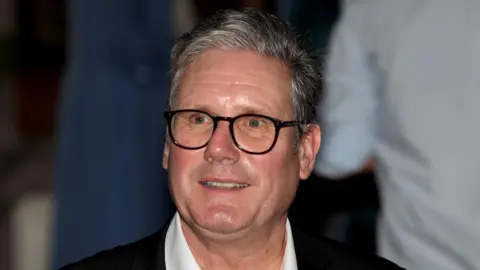 Getty Images
Getty ImagesSir Keir Starmer has attempted to define who “working people” are, amid renewed scrutiny of his tax plans ahead of next week’s Budget.
Labour promised at the general election not to increase taxes on working people – but it is looking to raise some taxes to fund public services.
This could include increases in tax on the sale of assets, such as shares and property, a freeze on income tax thresholds and changes to inheritance tax.
Sir Keir has repeatedly been asked whether “working people” would be hit by these changes.
He insists they won’t but has struggled to offer a clear definition of what counts as a working person in the government’s eyes.
In an interview during a Commonwealth leaders’ summit, the prime minister was asked whether those who work, but get additional income from assets such as shares or property, would count as working people.
He replied that they “wouldn’t come within my definition” – but warned against making “assumptions” about what that meant for tax policy.
He said he thought of a working person as someone who “goes out and earns their living, usually paid in a sort of monthly cheque” and who can’t “write a cheque to get out of difficulties”.
Speaking afterwards, his spokesman sought to clarify that those with a “small amount of savings” could still be defined as working people.
This could include cash savings, or stocks and shares in a tax-free Individual Savings Accounts (ISA), he suggested.
But ministers have been reluctant to translate these comments into numbers.
‘Hypotheticals’
The prime minister accepted that his own definition was “broad”.
Those people he had in mind, he added, were those who were “doing alright” but had an “anxiety in the bottom of their stomach” about making ends meet if something unexpected happened to their family.
The issue has taken on a central political importance ahead of next Wednesday’s Budget, Labour’s first since 2010, amid a row over whether the party is sticking to promises it made in its election manifesto.
During a BBC interview back in the UK, Treasury minister James Murray was asked repeatedly to give a more precise answer.
When asked whether someone who owned shares or sold a business could be a working person, he said he would not “get into too many hypotheticals”.
As well as the broad pledge not to raise taxes for working people, Labour’s manifesto specifically ruled out raising rates of income tax, along with National Insurance and Value Added Tax (VAT).
But ministers have not ruled out continuing to freeze income tax thresholds beyond 2028, a policy they inherited from the Conservatives, dragging more people into higher bands over time as wages rise with inflation.
And they have also not ruled out making employers pay National Insurance on their contributions to workers’ pension pots, which the Conservatives have branded a “tax on work” that will indirectly hit workers.
Labour peer Lord Blunkett, a cabinet minister in the Blair government, said the “logical outcome” of the move was that “employers will pay less”.
He also cautioned that he was unsure of the government’s definition of a working person, adding: “We’ve got to find a different phraseology”.
Other rumoured tax rises include to capital gains tax, which is paid on profits made by selling assets including shares and property other than a main home.
The government is also planning to increase the amount of money it raises in inheritance tax, which is paid after around 4% of deaths.
Multiple changes to the tax, which currently includes several exemptions and reliefs, are under consideration.
Politics
Minister put on spot over ‘working people’ definition
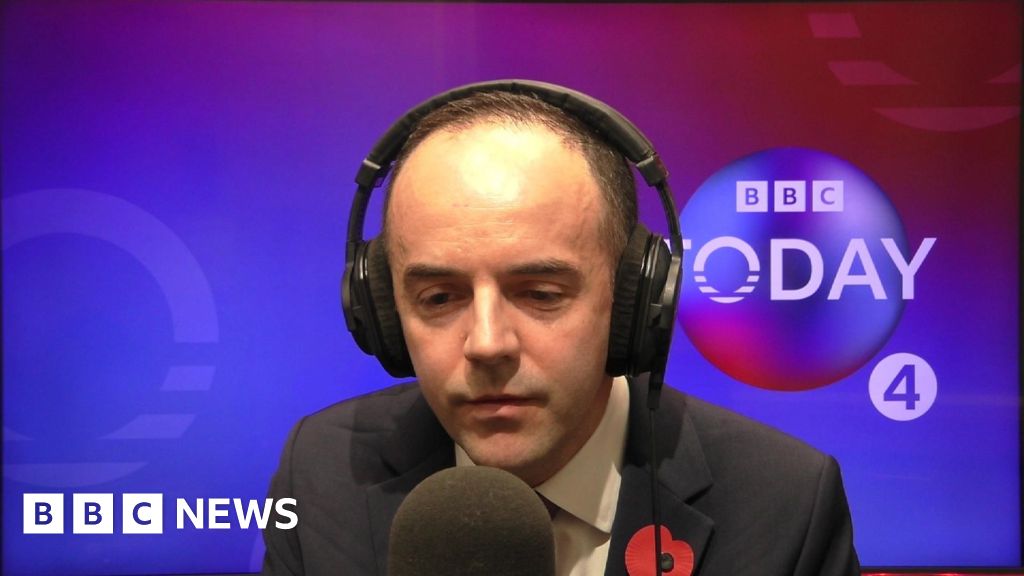
Treasury minister James Murray was asked to define “working people” amid speculation that the chancellor could raise some taxes in the Budget next week.
Murray said the government will keep its manifesto promise to “protect working people”, but he did not answer directly when asked if that group includes landlords, people who own shares or who sell a business.
“Working people are people who go out to work for their income,” he told presenter Nick Robinson on BBC Radio 4’s Today programme on Friday morning.
Asked for a fifth time if he would count landlords among that group, Murray said: “I’m not going to get into too many hypotheticals here, Nick.”
Politics
London mayor halves transport funding request from Budget

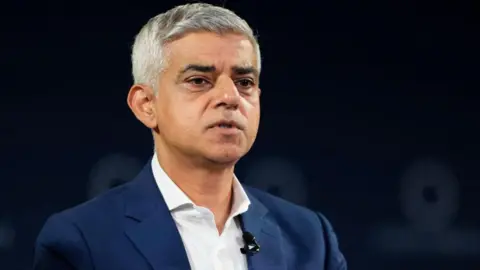 Getty Images
Getty ImagesLondon mayor Sadiq Khan has halved – compared to last year – the minimum amount of money he is asking from the government to fund major transport projects.
The Labour mayor had asked the last Tory government in 2023 for a minimum of £569m to pay for a range of infrastructure upgrades, and complained after receiving only £250m.
Khan told the Local Democracy Reporting Service he now believes it would count as “a win” to receive “anything more than £250m” from the Labour government.
City Hall Tories said the mayor was “watering down” what they claim were “exaggerated financial demands”.
Khan said the reduced funding demand was due to the “£22bn black hole” in public finances cited by the chancellor.
Ahead of the last government’s autumn statement in November last year, Khan had said in a letter to then-Chancellor Jeremy Hunt that Transport for London (TfL) “needs £569m in capital support for 2024/25 to support critical network upgrades and investment in critical road assets”.
He added: “Failure to secure this funding would put vital upgrades at risk and be detrimental to long-term infrastructure investment in the capital’s transport network, with consequential negative impacts on the wider UK economy.”
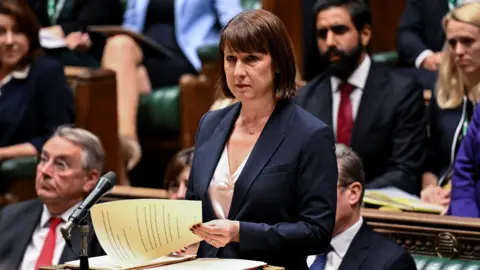 Jessica Taylor/Reuters
Jessica Taylor/ReutersHowever, asked earlier this week what he will be requesting from the new government, Khan said: “I’ll be asking for north of £250m. The £250m we got last year was before the £22bn black hole in the government’s year-to-year expenditure.”
The chancellor’s claim that she had inherited a £22bn gap in the public finances was met with ridicule by her Conservative opponents.
Her predecessor, Hunt, said she would “fool absolutely no one” and accused her of a “shameless attempt” to lay the groundwork for tax rises in her upcoming Budget.
But Khan insisted Reeves had been forced to find ways to “make ends meet”, and said, in that context: “I’ll ask for as much as I can get. But what I’m saying is, a win is getting anything more than £250m.”
He said the “real prize” will be at the spring spending review where he hoped to secure a multi-year deal for funding after the 2025/26 financial year.
Neil Garratt, leader of City Hall Conservatives said: “Last year the mayor said that £500m was the absolute minimum to stop TfL collapsing, but this year he claims that anything ‘north of £250m’ is a win.”
“Consistently under Khan’s mayoralty he made exaggerated financial demands, which made it impossible for a Conservative government to work constructively with him.
“Now that he has a Labour government he can’t get away with that; he’s forced to be honest. What other demands are going to be watered down in the next few years?”
Politics
A big week ahead and a chance for a government reset
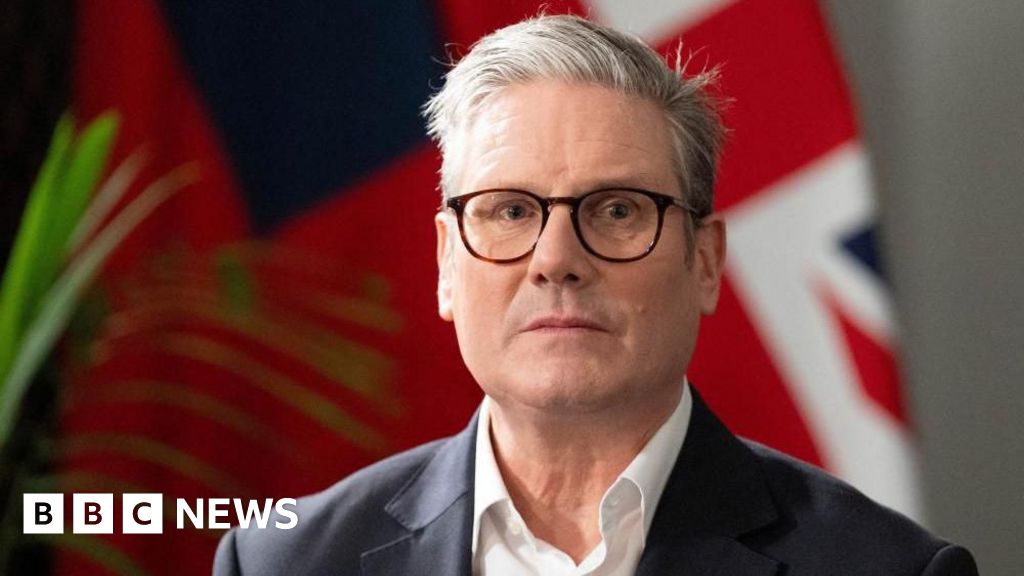
There is a big week ahead.
It will mark the end of the post-election chapter in British politics and the beginning of how the coming years are likely to feel.
A week on Saturday, the Conservatives will elect their new leader.
Rishi Sunak, a symbol of what went before, will finally exit the stage and his successor will enter it – and so become one of the central characters of the years ahead.
And on Wednesday, the highly anticipated and long talked about Budget will be published.
The Conservatives trying to sort themselves out in opposition and the Labour Party trying to sort themselves out in government have defined the four months since the general election.
Incidentally, in the interview I’ve just done with Prime Minister Sir Keir Starmer, he was at his most animated when I put it to him that his party seemed to be struggling to adjust to the realities of government.
Sir Keir leant forward towards me as I read out this list:
“Can I address that head on?” he said, before pointing to the early work the government has done to try to kickstart the economy.
It felt like I had touched a nerve.
Privately there are Labour folk frustrated at what they see as a stuttery start to their time in power.
They hope the next week can reset things – and shape the political landscape ahead.
First, though, for the prime minister – and those like me reporting on him – a body clock-smashing, jet lag-inducing, totally exhausting 20,000-mile round trip to the tropical south Pacific.
Little wonder Sir Keir is the first sitting British prime minister to visit a small Pacific island nation – we were on a plane for 28 hours to get here, and we have still got to get back.
The Commonwealth Heads of Government Meeting happens every other year and is a staple for prime ministers.
Sir Keir told me it was an important event for the UK, with the King and Queen here too – and pointed to the collective economic might of the Commonwealth’s members: a combined economic output of $20tn (£15.4tn).
This region, the Indo-Pacific, is also seen as increasingly economically important to the UK, post-Brexit.
Before we know it, though, the long schlep home will begin – via Hawaii, California and Winnipeg – and Westminster’s tilt towards the Budget will become total.
The confirmation from the chancellor, long hinted at, that the government is re-writing its rules, its choices, on borrowing and debt isn’t a surprise.
Its formal announcement, after weeks and weeks of hints, is part of a strategy to avoid surprises that could spook the markets – remember that is exactly what happened two years ago and it finished off firstly the then-chancellor, Kwasi Kwarteng, and then the prime minister, Liz Truss.
What else can we expect? Some spending cuts and some tax rises, particularly on those seen by the government as relatively well off – some of those, perhaps, who pay capital gains tax, inheritance tax or have significant pension savings, for instance.
They want to take what they see as difficult decisions early, with the next general election miles away.
“I believe in running towards problems,” Sir Keir told me. “If you know what the problem is, what the challenge is, every business knows this, every family knows it, run towards it and fix it.”
The challenge for them will be how that dash towards perceived problems goes down. Does it solve political problems for them, even if someway down the track, or create more?
Is this next chapter in politics one the government can own, shape and dominate, or will they continue to be buffeted by missteps and a new-look but shrivelled opposition opposite them?
Politics
Why the next Tory leader needs to go Cornish

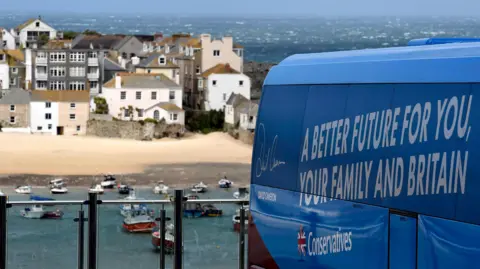 Getty Images
Getty ImagesNext Saturday we will finally find out who the Conservatives have chosen as their next party leader – and the leader of the UK government’s official opposition.
The two contenders, Kemi Badenoch and Robert Jenrick, are both seen as being on the right of the party, and their core messages, on immigration and cultural issues, seem designed to win back support from Nigel Farage’s Reform UK.
But the new leader will also need to do something about the votes the Tories lost to the Liberal Democrats and Labour in July’s general election, if they are going to restore their party’s battered fortunes.
Few parts of the country illustrate the challenge the new leader will face better than Cornwall.
The county used to be a sea of Conservative blue. Until recently, the party held all six Parliamentary seats.
But the tide turned in July’s election, and they were all washed away.
The Tories lost four seats to Labour and two to the Lib Dems, while Reform UK took votes across the board.
In the market town of Liskeard, which sits in a constituency the Tories lost to Labour, Richard Dorling chairs the South East Cornwall Conservative Association and spent time during the election knocking on doors and hearing voters’ concerns.
“They’re looking for people to take charge and reduce immigration and stop the boats, and Reform have a very strong story for that,” he said.
“Whoever gets into the leadership position is going to have to come up with a new plan to tackle that, and get the voters back.”
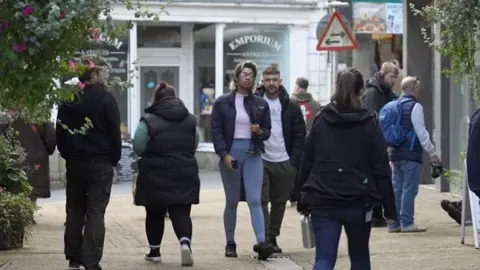
While some Tories argue addressing the concerns of voters attracted to Nigel Farage’s party is crucial, others have warned against tacking to the right to counter the threat posed by Reform UK, for fear it will permanently alienate more centrist former Conservative supporters who turned to Labour or the Lib Dems.
When Kemi Badenoch and Robert Jenrick became the final two candidates, it was widely seen as a signal the party would shift to the political right.
Connor Donnithorne, who stood for the Conservatives in Camborne & Redruth but lost to Labour, said focusing on the party’s position on the political spectrum was the wrong approach.
“You need to be in the common ground of British politics if you want to win,” he said. “That doesn’t mean you have to be in the centre, or the left or right.
“If we go down that path over the next five years, we’re not going to win again because you’re too focused on the internal politics of parties that the overwhelming majority of people in this country don’t actually care about.”

He argues that the party needs to focus on “common ground” issues such as “controlled immigration, lower taxes for working people, and supporting small businesses to create jobs”.
“It’s about having credibility, it’s about being in touch with what people want and it’s about delivering what say you say you’re going to deliver,” he adds.
It’s not just their fractured voting base the new Conservative leader will have to win round.
Kemi Badenoch or Robert Jenrick will have to unite a parliamentary party that’s been publicly arguing over its differences for years – and has been pretty adept at ousting leaders.
In reaching the final two, neither candidate won support from a majority of MPs, so whoever wins will do so knowing only around a third of the parliamentary party backed them.
Nick Craker, a Conservative councillor in Cornwall, said the leadership candidates need to focus on policies that unite the Conservatives rather than those that have the potential to divide them, including Robert Jenrick’s plan to leave the European Convention on Human Rights (ECHR) and “culture wars” confronted by Kemi Badenoch.
“The idea of leaving the ECHR, for example, makes me very nervous,” said Mr Craker.
“I just see that as a really divisive issue that’s going to cause infighting. I just think if you bring something like that forward, there’s going to be at least 50 MPs who are going to be very concerned about it.
“Similarly with some of Kemi’s ideas around gender and race and the culture wars, that makes me a bit nervous, because again she may have some really sound arguments to make on that, but there another 50 MPs at least that have probably got very different views to her and that’s going to just sow a bit more division and infighting.
“And what have we learnt from the last election? Divided parties don’t win.”

Badenoch and Jenrick are currently pitching to the party membership who are casting their ballots in this contest, but it will not be long before one of them will have to start pitching to the country.
In Cornwall, one message reflected by activists is the need for the party leadership to talk to grassroots members of the party who, they say, understand the issues in their communities.
Alison Hernandez, the Conservative Police and Crime Commissioner for Devon and Cornwall, said: “I think they’ve lost their way with being able to connect with members and activists in the party, and I think that needs to change – that connection.”
Of course, whoever leads the Conservative Party after 2 November will do so as a party of opposition – something neither Robert Jenrick or Kemi Badenoch have experienced as MPs.
That makes fighting for relevance harder when airtime and attention doesn’t come as easily.
Ms Hernandez added: “It feels like we’re invisible at the moment on the national stage, and it’s really important we’ve got someone who can embody the values of Conservatism and communicate that to the wider public.”
The Conservative Party is wrestling right now with what those values are, but the bigger question will ultimately be what the public makes of them.
Politics
‘We can’t change our history’ on slave trade, says Keir Starmer

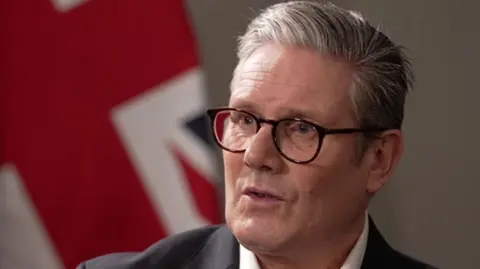 BBC
BBCThe UK “can’t change our history”, Prime Minister Sir Keir Starmer has told the BBC when asked about paying reparations to countries impacted by the transatlantic slave trade.
His comments come after diplomatic sources told the BBC that Commonwealth heads of government want to start a “meaningful conversation” about an issue that could mean the UK paying billions of pounds for its historical role in the trade.
Sir Keir, who is currently in Samoa for a meeting of Commonwealth countries, said the trade was “abhorrent” and that it was important to “talk about our history”.
Chancellor Rachel Reeves ruled out making payments, in an interview earlier on Thursday, saying “that’s not something that this government is doing”.
However, he added that the focus should be on “today’s challenges” including resilience in the face of climate change and boosting trade between Commonwealth nations.
He added he wanted to help member countries work with international financial institutions to “unlock money that might help them” in relation to climate change.
Leaders from 56 countries are attending the Commonwealth Heads of Government Meeting taking place in Samoa on Friday and Saturday.
Commonwealth leaders are expected to defy the UK and debate ways of securing reparations for historical slavery. At its height, Britain was the world’s biggest slave-trading nation. Downing Street has the issue is not on the agenda for the summit.
Reparatory justice for slavery can come in many forms, including financial reparations, debt relief, an official apology, educational programmes, building museums, economic support, and public health assistance.
In the run-up to the summit, there have been growing calls from Commonwealth leaders for the UK to apologise and make reparations.
King Charles will formally open the summit and is expected to use his opening speech to pay tribute to his mother the late Queen Elizabeth II and her connection to the Commonwealth.
He will also say the Commonwealth’s scale and diversity allows it to “discuss the most challenging issues with openness and respect”.
During the gathering, a new Commonwealth secretary general will be elected. All three of the candidates – Shirley Botchwey of Ghana, Joshua Setipa of Lesotho and Mamadou Tangara of Gambia – back reparatory justice.
Speaking to BBC Radio 4’s Today programme, Frederick Mitchell, the foreign minister of the Bahamas, said he believed the UK would change its stance, saying: “It may take a while for people to come around but come around they will.”
During the interview with the BBC, Sir Keir was also asked about a complaint Donald Trump’s team has filed against the Labour Party objecting to its staff and activists volunteering for Kamala Harris’s presidential campaign.
“I think this needs to be seen for what it is,” the prime minister said, adding: “It is some Labour Party members and staff in their free time campaigning.
“It’s happened in every election in different parts of the world. All political parties do it… I think it needs to be put in it’s proper perspective.”
Sir Keir added that both he and Trump wanted to have a “good working relationship” and that the pair recently had dinner together.
He dismissed suggestions that his party were still adjusting to being in government, saying he had “absolute clarity” on his “number one mission” of economic growth.
Next Wednesday Chancellor Rachel Reeves, will set out the government’s tax and spending plans in the Budget.
Ahead of this Reeves told the BBC she would be changing the government’s self-imposed debt rules to free up money for infrastructure spending.
Asked about the Budget, Sir Keir said the economy barely grew under the Conservatives and that he wanted to “clear the decks” and “clear up the mess”.
“I believe in running towards problems. If you know what the problem is, what the challenge is, every business knows this, every family knows it, run towards it and fix it.”
The Conservatives have challenged Labour’s argument that they created a £22bn black hole in the economy and questioned the chancellor’s decision to change the debt rules.
The party’s shadow Treasury minister Gareth Davies said “uncertainty over additional borrowing risks interest rates staying higher and for longer.
“It’s families up and down the country who would pay the price.”
-

 Technology4 weeks ago
Technology4 weeks agoIs sharing your smartphone PIN part of a healthy relationship?
-

 Science & Environment1 month ago
Science & Environment1 month agoHow to unsnarl a tangle of threads, according to physics
-

 Science & Environment1 month ago
Science & Environment1 month agoHyperelastic gel is one of the stretchiest materials known to science
-

 Science & Environment1 month ago
Science & Environment1 month ago‘Running of the bulls’ festival crowds move like charged particles
-

 Science & Environment1 month ago
Science & Environment1 month agoMaxwell’s demon charges quantum batteries inside of a quantum computer
-

 Technology1 month ago
Technology1 month agoWould-be reality TV contestants ‘not looking real’
-

 Science & Environment4 weeks ago
Science & Environment4 weeks agoX-rays reveal half-billion-year-old insect ancestor
-

 Science & Environment1 month ago
Science & Environment1 month agoSunlight-trapping device can generate temperatures over 1000°C
-

 Technology4 weeks ago
Technology4 weeks agoUkraine is using AI to manage the removal of Russian landmines
-

 Science & Environment1 month ago
Science & Environment1 month agoLiquid crystals could improve quantum communication devices
-

 Science & Environment1 month ago
Science & Environment1 month agoQuantum ‘supersolid’ matter stirred using magnets
-

 TV3 weeks ago
TV3 weeks agoসারাদেশে দিনব্যাপী বৃষ্টির পূর্বাভাস; সমুদ্রবন্দরে ৩ নম্বর সংকেত | Weather Today | Jamuna TV
-

 Football3 weeks ago
Football3 weeks agoRangers & Celtic ready for first SWPL derby showdown
-

 Science & Environment1 month ago
Science & Environment1 month agoLaser helps turn an electron into a coil of mass and charge
-

 Science & Environment1 month ago
Science & Environment1 month agoA new kind of experiment at the Large Hadron Collider could unravel quantum reality
-

 Womens Workouts1 month ago
Womens Workouts1 month ago3 Day Full Body Women’s Dumbbell Only Workout
-

 News3 weeks ago
News3 weeks agoMassive blasts in Beirut after renewed Israeli air strikes
-

 News3 weeks ago
News3 weeks ago▶ Hamas Spent $1B on Tunnels Instead of Investing in a Future for Gaza’s People
-

 Technology3 weeks ago
Technology3 weeks agoSamsung Passkeys will work with Samsung’s smart home devices
-

 Business3 weeks ago
Business3 weeks agoWhen to tip and when not to tip
-

 MMA3 weeks ago
MMA3 weeks ago‘Uncrowned queen’ Kayla Harrison tastes blood, wants UFC title run
-

 Sport3 weeks ago
Sport3 weeks agoBoxing: World champion Nick Ball set for Liverpool homecoming against Ronny Rios
-

 News3 weeks ago
News3 weeks agoNavigating the News Void: Opportunities for Revitalization
-

 Technology4 weeks ago
Technology4 weeks agoMicrophone made of atom-thick graphene could be used in smartphones
-

 Sport3 weeks ago
Sport3 weeks agoMan City ask for Premier League season to be DELAYED as Pep Guardiola escalates fixture pile-up row
-

 Science & Environment1 month ago
Science & Environment1 month agoPhysicists have worked out how to melt any material
-

 Science & Environment1 month ago
Science & Environment1 month agoWhy this is a golden age for life to thrive across the universe
-

 Science & Environment1 month ago
Science & Environment1 month agoQuantum forces used to automatically assemble tiny device
-

 News1 month ago
News1 month ago▶️ Hamas in the West Bank: Rising Support and Deadly Attacks You Might Not Know About
-
Business3 weeks ago
DoJ accuses Donald Trump of ‘private criminal effort’ to overturn 2020 election
-

 MMA3 weeks ago
MMA3 weeks agoPereira vs. Rountree prediction: Champ chases legend status
-

 News3 weeks ago
News3 weeks ago‘Blacks for Trump’ and Pennsylvania progressives play for undecided voters
-

 Sport3 weeks ago
Sport3 weeks agoWales fall to second loss of WXV against Italy
-

 MMA3 weeks ago
MMA3 weeks agoDana White’s Contender Series 74 recap, analysis, winner grades
-

 Sport3 weeks ago
Sport3 weeks agoAaron Ramsdale: Southampton goalkeeper left Arsenal for more game time
-

 Science & Environment1 month ago
Science & Environment1 month agoA slight curve helps rocks make the biggest splash
-

 Technology1 month ago
Technology1 month agoMeta has a major opportunity to win the AI hardware race
-

 Science & Environment1 month ago
Science & Environment1 month agoNerve fibres in the brain could generate quantum entanglement
-

 MMA3 weeks ago
MMA3 weeks agoJulianna Peña trashes Raquel Pennington’s behavior as champ
-

 Technology3 weeks ago
Technology3 weeks agoMusk faces SEC questions over X takeover
-

 Technology3 weeks ago
Technology3 weeks agoThis AI video generator can melt, crush, blow up, or turn anything into cake
-

 Football3 weeks ago
Football3 weeks agoWhy does Prince William support Aston Villa?
-

 Sport3 weeks ago
Sport3 weeks agoSturm Graz: How Austrians ended Red Bull’s title dominance
-

 News3 weeks ago
News3 weeks agoFamily plans to honor hurricane victim using logs from fallen tree that killed him
-

 Science & Environment1 month ago
Science & Environment1 month agoITER: Is the world’s biggest fusion experiment dead after new delay to 2035?
-

 Science & Environment1 month ago
Science & Environment1 month agoHow to wrap your mind around the real multiverse
-

 Science & Environment1 month ago
Science & Environment1 month agoNuclear fusion experiment overcomes two key operating hurdles
-

 Technology1 month ago
Technology1 month agoWhy Machines Learn: A clever primer makes sense of what makes AI possible
-

 Technology4 weeks ago
Technology4 weeks agoRussia is building ground-based kamikaze robots out of old hoverboards
-

 Science & Environment1 month ago
Science & Environment1 month agoTime travel sci-fi novel is a rip-roaringly good thought experiment
-

 News1 month ago
News1 month ago▶️ Media Bias: How They Spin Attack on Hezbollah and Ignore the Reality
-

 Money3 weeks ago
Money3 weeks agoWetherspoons issues update on closures – see the full list of five still at risk and 26 gone for good
-

 Technology3 weeks ago
Technology3 weeks agoGmail gets redesigned summary cards with more data & features
-
Business3 weeks ago
Sterling slides after Bailey says BoE could be ‘a bit more aggressive’ on rates
-

 Technology3 weeks ago
Technology3 weeks agoMicrosoft just dropped Drasi, and it could change how we handle big data
-

 Sport3 weeks ago
Sport3 weeks agoChina Open: Carlos Alcaraz recovers to beat Jannik Sinner in dramatic final
-

 Technology3 weeks ago
Technology3 weeks agoThe best budget robot vacuums for 2024
-

 Sport3 weeks ago
Sport3 weeks agoCoco Gauff stages superb comeback to reach China Open final
-

 Entertainment3 weeks ago
Entertainment3 weeks agoNew documentary explores actor Christopher Reeve’s life and legacy
-

 Sport4 weeks ago
Sport4 weeks agoWorld’s sexiest referee Claudia Romani shows off incredible figure in animal print bikini on South Beach
-
Business3 weeks ago
Bank of England warns of ‘future stress’ from hedge fund bets against US Treasuries
-

 Business3 weeks ago
Business3 weeks agoChancellor Rachel Reeves says she needs to raise £20bn. How might she do it?
-

 News3 weeks ago
News3 weeks agoWoman who died of cancer ‘was misdiagnosed on phone call with GP’
-

 Technology3 weeks ago
Technology3 weeks agoTexas is suing TikTok for allegedly violating its new child privacy law
-

 MMA3 weeks ago
MMA3 weeks agoPereira vs. Rountree preview show live stream
-

 Technology3 weeks ago
Technology3 weeks agoThe best shows on Max (formerly HBO Max) right now
-

 Sport3 weeks ago
Sport3 weeks ago2024 ICC Women’s T20 World Cup: Pakistan beat Sri Lanka
-

 Technology3 weeks ago
Technology3 weeks agoEpic Games CEO Tim Sweeney renews blast at ‘gatekeeper’ platform owners
-

 MMA3 weeks ago
MMA3 weeks agoAlex Pereira faces ‘trap game’ vs. Khalil Rountree
-

 News3 weeks ago
News3 weeks agoGerman Car Company Declares Bankruptcy – 200 Employees Lose Their Jobs
-

 MMA3 weeks ago
MMA3 weeks agoUFC 307 preview show: Will Alex Pereira’s wild ride continue, or does Khalil Rountree shock the world?
-

 MMA3 weeks ago
MMA3 weeks ago‘I was fighting on automatic pilot’ at UFC 306
-

 MMA3 weeks ago
MMA3 weeks agoKetlen Vieira vs. Kayla Harrison pick, start time, odds: UFC 307
-
News1 month ago
the pick of new debut fiction
-

 News1 month ago
News1 month agoOur millionaire neighbour blocks us from using public footpath & screams at us in street.. it’s like living in a WARZONE – WordupNews
-

 Football3 weeks ago
Football3 weeks agoSimo Valakari: New St Johnstone boss says Scotland special in his heart
-

 Technology3 weeks ago
Technology3 weeks agoJ.B. Hunt and UP.Labs launch venture lab to build logistics startups
-

 News3 weeks ago
News3 weeks agoHull KR 10-8 Warrington Wolves – Robins reach first Super League Grand Final
-

 Technology3 weeks ago
Technology3 weeks agoOpenAI secured more billions, but there’s still capital left for other startups
-
Business3 weeks ago
The search for Japan’s ‘lost’ art
-

 Business3 weeks ago
Business3 weeks agoStark difference in UK and Ireland’s budgets
-

 News3 weeks ago
News3 weeks agoBalancing India and China Is the Challenge for Sri Lanka’s Dissanayake
-

 News3 weeks ago
News3 weeks agoHeavy strikes shake Beirut as Israel expands Lebanon campaign
-

 TV3 weeks ago
TV3 weeks agoLove Island star sparks feud rumours as one Islander is missing from glam girls’ night
-

 Science & Environment3 weeks ago
Science & Environment3 weeks agoMarkets watch for dangers of further escalation
-

 TV3 weeks ago
TV3 weeks agoPhillip Schofield accidentally sets his camp on FIRE after using emergency radio to Channel 5 crew
-

 News3 weeks ago
News3 weeks agoHeartbreaking end to search as body of influencer, 27, found after yacht party shipwreck on ‘Devil’s Throat’ coastline
-

 Technology3 weeks ago
Technology3 weeks agoPopular financial newsletter claims Roblox enables child sexual abuse
-
Business3 weeks ago
Head of UK Competition Appeal Tribunal to step down after rebuke for serious misconduct
-

 Technology3 weeks ago
Technology3 weeks agoApple iPhone 16 Plus vs Samsung Galaxy S24+
-

 TV3 weeks ago
TV3 weeks agoMaayavi (මායාවී) | Episode 23 | 02nd October 2024 | Sirasa TV
-
Politics3 weeks ago
Rosie Duffield’s savage departure raises difficult questions for Keir Starmer. He’d be foolish to ignore them | Gaby Hinsliff
-

 Health & fitness3 weeks ago
Health & fitness3 weeks agoNHS surgeon who couldn’t find his scalpel cut patient’s chest open with the penknife he used to slice up his lunch
-

 Money3 weeks ago
Money3 weeks agoPub selling Britain’s ‘CHEAPEST’ pints for just £2.60 – but you’ll have to follow super-strict rules to get in
-

 Technology3 weeks ago
Technology3 weeks agoIf you’ve ever considered smart glasses, this Amazon deal is for you
-

 News3 weeks ago
News3 weeks agoLiverpool secure win over Bologna on a night that shows this format might work
-

 Technology3 weeks ago
Technology3 weeks agoAmazon’s Ring just doubled the price of its alarm monitoring service for grandfathered customers
-

 Technology3 weeks ago
Technology3 weeks agoHow to disable Google Assistant on your Pixel Watch 3
-
Business3 weeks ago
Can liberals be trusted with liberalism?
-

 Technology3 weeks ago
Technology3 weeks agoA very underrated horror movie sequel is streaming on Max


You must be logged in to post a comment Login